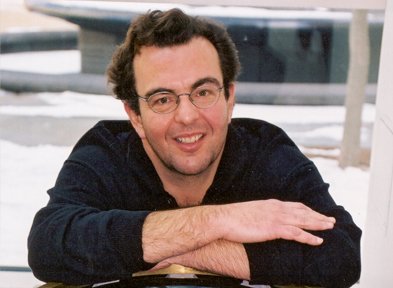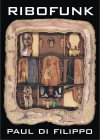 |
Interview Thread
<< | >>
| SEPTEMBER ISSUE |
-
-
-
Di Filippo Interview
-
-
-
September Issue Thread
<< | >>
-
Mailing Date:
26 August 2003
|
| LOCUS MAGAZINE |



Indexes to the Magazine:
|
| |
|
|
 |
 |
THE MAGAZINE OF THE SCIENCE FICTION & FANTASY FIELD
 |  |

|
 |

|
Paul Di Filippo: A La Modes |
September 2003 |
|
Paul Di Filippo grew up in Rhode Island, then spent time in Hawaii and Europe before returning to work at Brown University Bookstore until becoming a full time writer in 1994. His first story sold in 1977 to UnEarth magazine; later stories included "Kid Charlemagne" (1987) and "Lennon Spex" (1992), both Nebula nominees, "The Double Felix" (1994), winner of a BSFA Award, and novella "Karuna, Inc." (2001), a World Fantasy Award
|
|

Photo by Charles N. Brown
|
nominee. Collections include The Steampunk Trilogy (1995), Ribofunk (1996), and most recently Babylon Sisters and Other Posthumans
and Little Doors (both 2002). Ciphers (1997) was his first novel, followed by Joe's Liver (2000), two novels written with Michael Bishop (as Philip Lawson), Would It Kill You to Smile? (1998) and Muskrat Courage (2000), A Mouthful of Tongues and novella A Year in the Linear City (both 2002, the latter a Hugo nominee), and Fuzzy Dice (2003). Di Filippo writes reviews for Asimov's, The Washington Post, and Science Fiction Weekly. He lives in Providence, Rhode Island.
Excerpts from the interview:
“I've been described as jumping around in the field. But what can you do? It's the nature of each individual. Some people find a steady niche they want to explore and excavate really deeply. Other people — we're like butterflies flitting from flower to flower and not finding one to settle down on. But it's the nature of my personality, always to be pushing into a different area.
“I find a number of science-fictional styles very attractive and bounce around between them. When I was starting to seriously apply myself to SF back in '82, the cyberpunk movement was bubbling under. John Shirley was doing some interesting work and Rudy Rucker had been published pretty extensively. So there was this nascent undercurrent that was appealing to me. I started thinking in cyberpunk terms, though I didn't even have a word for what I was doing at the time. Near-future scenarios, getting more to the street level of things, maybe looking at how capitalism was affecting society. I got shanghaied into the whole cyberpunk movement — very willingly, because it was a movement after my heart. I did a few stories in that vein, like 'Kid Charlemagne' before I read Neuromancer: that crystallized everything, and I wrote 'Stone Lives'. I think I had just gotten onto the mailing list of Bruce Sterling's fanzine Cheap Truth. He read the story and thought it was good enough to put in Mirrorshades.
 “I was happy to be associated with that whole movement, but on the other hand I began to see drawbacks or blind spots in the cyberpunk worldview. To be kind of silly or parodic about the whole thing, I coined the term 'ribofunk' — 'ribo' out of biology (the ribosome) and then another musical form, 'funk' instead of 'punk' — and made a little Xerox manifesto, tongue-in-cheek at this point. Then I was infected by my own idea, my own joke, and I started to do a bunch of stories that were later collected in Ribofunk. It's funny when you create a word like this. If you do a Google search now, you'll get almost 2,000 hits, so this word I came up with almost as a parody now has its own existence. Not to say that any of the people writing biologically-inspired SF have even heard of me, but I think you could come up with a ribofunk school where you take the sassiness and jazziness of cyberpunk as a stylistic thing and you put your focus on biology instead of the digital world, and you'll see a bunch of books that fall into this way of thinking.”
“I was happy to be associated with that whole movement, but on the other hand I began to see drawbacks or blind spots in the cyberpunk worldview. To be kind of silly or parodic about the whole thing, I coined the term 'ribofunk' — 'ribo' out of biology (the ribosome) and then another musical form, 'funk' instead of 'punk' — and made a little Xerox manifesto, tongue-in-cheek at this point. Then I was infected by my own idea, my own joke, and I started to do a bunch of stories that were later collected in Ribofunk. It's funny when you create a word like this. If you do a Google search now, you'll get almost 2,000 hits, so this word I came up with almost as a parody now has its own existence. Not to say that any of the people writing biologically-inspired SF have even heard of me, but I think you could come up with a ribofunk school where you take the sassiness and jazziness of cyberpunk as a stylistic thing and you put your focus on biology instead of the digital world, and you'll see a bunch of books that fall into this way of thinking.”
*
“I tell people my novel Ciphers is a thematic sequel to Gravity's Rainbow. As much as I loved Pynchon, I saw areas where he was ... not deficient, but just hadn't turned his gaze in certain directions. I thought if I ventured down these little alleyways he hadn't explored I could contribute something new to this form, so I set out to write this massive conspiracy novel. I had this mental image of two people in the open cabin of a helicopter, struggling over a reel of magnetic recording tape with some very vital data on it — as they struggled, the tape plummeted out of the helicopter and just unspooled. That mental image came to me out of the blue, and that doesn't happen to me often. Somehow it was the seed of this novel, even though it totally vanished in the writing of the book.”
*

“Coming out this year is a novel called Fuzzy Dice. It's not a very long book, maybe 70 or 80,000 words, but it has 144 chapters. I was always a big fan of A.E. van Vogt, and van Vogt had this famous dictate: 'I change the plot every 600 words.' I started thinking, 'Could that actually be done?' Fuzzy Dice utilizes a lot of small chapters that are always skittering off at different angles. A lot of my stuff arises out of intellectual challenges, so that was one of my main motivators. (Of course there has to be a story, and every other component of fiction has to be there.)”
*
“I read anywhere from three to five newspapers a day. Part of my interest is that I have another vocation that not many people know about — I'm a stringer for 'News of the Weird', a wonderful syndicated feature (now available online as well) with abstracts of the strangest, most bizarre news events that happen throughout the globe. Chuck Shepard didn't invent the thing, but he kind of systematized it. He relies on correspondents like myself. We very diligently search through all our local papers looking for the most bizarre things, then we clip these articles and send them to News of the Weird Central. This has become an addiction for me, and it alleviates some of the grimness of the rest of the news if you're always looking for the sillier bits. I'm a citizen of this country and a citizen of the world. Controversies and current events obviously influence me as much as anybody. I don't think it's possible to exclude that from your fiction. But it's never the dominant urge in my work; it's an undercurrent. I try to stay abreast of what's going on.”
The full interview, with biographical profile, is published in the September 2003 issue of Locus Magazine.
You may purchase this issue for $7.95 by sending a check to Locus, PO Box 13305, Oakland CA 94661; or for $10 via credit card submitted by mail, e-mail, or phone at (510) 339-9198. (Or, Subscribe.)
|
 |

|
 |

